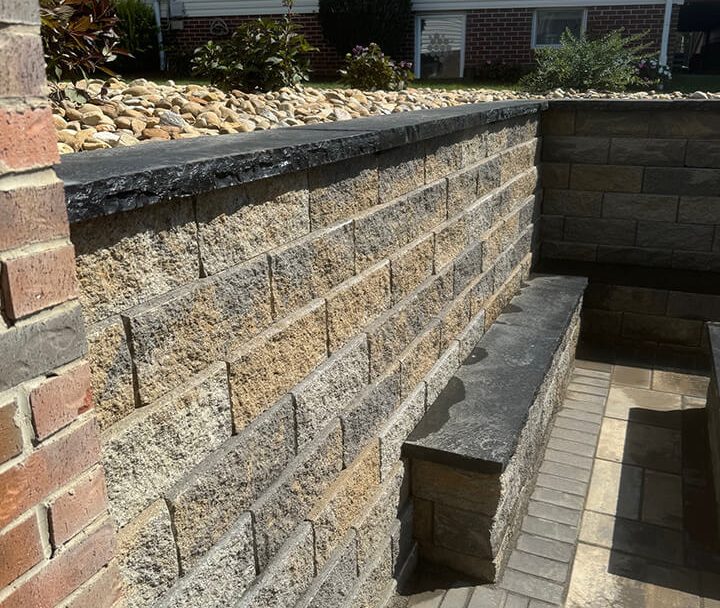
With hilly terrain and rainy spring seasons, homeowners often need retaining walls in Allison Park and the greater Pittsburgh area. Retaining walls can help your home in a number of ways. One major way they improve your property is by making steep or uneven terrain more usable by providing flat, level areas for planting gardens, creating patios, installing playsets, and more. Another critical function of retaining walls is erosion control: these structures help stabilize soil, prevent runoff, and direct water flow away from your foundation and landscaping.
If you’re searching for retaining wall builders in Pittsburgh but aren’t familiar with the process of hiring contractors, you might feel overwhelmed by all the options. How do you know which companies are reliable? What qualifications should you look for? What questions should you ask during the quote process?
In this comprehensive guide, we’ll explain everything you need to know to choose the best contractor for your retaining wall project, from assessing experience and credentials to understanding the different systems and materials used in wall construction.
Why Hiring the Right Retaining Wall Builder Matters
Avoiding Structural Failure and Costly Repairs
Retaining walls are not just decorative features for Allison Park homeowners; they serve a critical structural purpose by holding back soil and managing changes in elevation. When these walls fail, due to improper construction, lack of drainage, or inferior materials, the results can be disastrous. Soil erosion, property damage, and even injuries are not uncommon when retaining walls collapse.
Hiring a skilled and experienced contractor helps ensure your wall is built to withstand the pressure it’s designed to handle. Reinforced walls with proper footings and drainage systems drastically reduce the likelihood of leaning, cracking, or catastrophic failure.
Maximizing Function and Longevity
A properly constructed retaining wall can last for decades, particularly when the builder incorporates long-lasting materials and follows best practices for reinforcement and backfill. The right contractor will design your wall not only for today’s needs but also for long-term stability, factoring in the slope, soil composition, water flow, and load-bearing requirements.
Professionally installed retaining walls are constructed to stand up to shifts in soil and weather cycles, ensuring they remain functional through Pittsburgh’s seasonal freeze-thaw cycles.
Enhanced Property Value and Curb Appeal
Aside from its functional benefits, a retaining wall can be a visually stunning landscape feature that boosts your home’s curb appeal. Builders with a strong aesthetic sense can integrate retaining walls into patios, gardens, or outdoor living spaces using stone veneers, tiered designs, and complementary materials.
A well-designed retaining wall isn’t just a solution it’s an asset that adds usable square footage and increases your property’s resale value.
Professional Advantage Over DIY
While DIY options may seem cost-effective, they often lack proper engineering. DIY walls typically fall short on drainage, compacted base prep, and reinforcement techniques, leading to early failure. Hiring a professional means getting the right tools, permits, and techniques from the start, which saves time, frustration, and money in the long run.
Experience & Specialization
Look for Retaining Wall Specialists
Not every contractor who advertises “retaining wall installation services” has the specialized knowledge needed for complex builds. It’s essential to choose a contractor whose core focus is retaining walls, especially if your property involves steep slopes or water management challenges.
Retaining wall specialists have the training to handle walls over four feet tall, which may require engineering drawings and permit approval. These pros can work with geogrid reinforcement, understand load-bearing calculations, and know how to protect nearby trees and root systems during excavation.
Importance of Local Experience
Builders with years of experience in Western Pennsylvania are more likely to understand the challenges presented by the region’s topography and weather. From heavy clay soils to steep inclines and spring downpours, Pittsburgh-area landscapes require a thoughtful, site-specific approach.
Ask if the contractor has completed projects in your specific neighborhood. Local references offer peace of mind and can give you a firsthand look at how their work holds up under real conditions.
Licensing, Insurance, and Certifications to Look For
Verify Proper Licensing
Although Pennsylvania doesn’t require a state-issued contractor license for every type of landscaping work, many local governments do. Allegheny County municipalities often require contractors to register or pull permits for retaining wall projects.
Before work begins, ask for proof of business registration and check with your municipality to confirm requirements. A professional contractor should be forthcoming with this information and have no problem supplying it.
Insurance Is Non-Negotiable
Even with careful planning, construction work involves risk. If a contractor damages your home, underground utility lines, or landscaping, or if a worker gets hurt on your property, you don’t want to be liable. That’s why confirming insurance coverage is crucial.
Request documentation for:
General liability insurance, which protects against damage to your property
Workers’ compensation insurance, which covers injured employees on your property
Professional Certifications Add Credibility
Look for accreditations or manufacturer certifications. Organizations like the ICPI (Interlocking Concrete Pavement Institute) and NCMA (National Concrete Masonry Association) provide education and testing on structural standards. Builders trained by leading block manufacturers such as Belgard or Techo-Bloc are often better equipped to follow industry best practices.
Materials & Methods Commonly Used for Retaining Wall Installation
Common Retaining Wall Materials
The best material depends on your site, budget, and aesthetic goals:
Concrete blocks (segmental retaining walls): Engineered for strength, easy to install, and available in various textures/colors. A go-to choice for many Pittsburgh homes.
Natural stone: Ideal for an organic, rustic look. Durable but more labor-intensive and often higher in cost.
Timber: Suitable for short-term or small garden walls. Lower cost but susceptible to decay, pests, and weathering over time.
Poured concrete: Offers a sleek, modern appearance and excellent strength. However, it is expensive and harder to repair than block systems.
Discuss material options with your contractor and ask to see samples or pictures from previous jobs.
Construction Techniques Matter
A retaining wall is only as strong as its foundation and drainage.
Your contractor should explain:
Base prep: Most walls require a compacted gravel base several inches deep.
Drainage systems: Perforated drainpipes, gravel backfill, and weep holes prevent hydrostatic pressure buildup.
Reinforcement: Taller walls often need geogrid mesh embedded into the soil behind the wall.
Step-backs and batter: Walls must lean slightly into the hill for structural support.
The best contractors will educate you, not just sell to you. Be sure to work with someone who can provide you with a clear explanation of what to expect.
The Importance of Requesting a Portfolio and References from Potential Contractors
Review Before-and-After Work
Visual proof is key. You want to see photos of their past work to confirm they can deliver the style and quality you are looking for. Ask for:
- A project portfolio or digital gallery
- Close-ups of wall finishes and corners
- Pictures taken months or years after completion (to assess durability)
Request References
Speaking with past clients gives you valuable insight into what it is like to work with contractors, how they conduct business, their installation process, and more. Ask:
- Did the project finish on time and within budget?
- How did the builder handle weather delays or changes?
- Are they satisfied with how the wall performs today?
- Reviews on Google, Facebook, or Angi help confirm consistency in service quality.
Permitting and Local Regulations in the Pittsburgh Area
Know the Local Rules
In most areas of Allegheny County, retaining walls over 4ft typically require engineered drawings, permits, and municipal inspections. Walls near property lines or public infrastructure (like storm drains or sidewalks) may also require zoning approval.
If you skip the permitting process, you could face fines or even be forced to tear down the wall.
Your Builder Should Handle This
An experienced builder will include permit procurement in the scope of work. They’ll work with engineers if needed and schedule inspections at key project phases.
Ask:
- Will permitting be included in the cost?
- Do you work with engineers on higher walls?
- Can you navigate township or borough review processes?
Estimates and Transparent Pricing
What a Good Quote Includes
A professional estimate should be itemized and easy to understand. It should clearly outline:
Materials (type, brand, quantity)
Labor (excavation, construction, drainage)
Estimated timeline
Permit and inspection fees
Payment terms (deposit, progress payments, final balance)
Avoid vague, handwritten estimates or verbal quotes.
Beware of Lowball Offers
Too-good-to-be-true quotes usually are. These bids may omit drainage, cut corners on base prep, or use unskilled labor. In the long term, these shortcuts will cost you more in repairs or replacements.
Always compare at least 2–3 quotes, and don’t be afraid to ask clarifying questions.
Red Flags to Watch For in Retaining Wall Contractors
If you’ve never hired a contractor, it’s critical to know some of the most common red flags. Keep an eye out for warning signs such as:
- No written contract
- Pushy sales tactics or “today-only” deals
- No proof of insurance or licensure
- No project timeline
- Avoiding references or not having a portfolio
- Disregard for permits or codes
- Lack of drainage planning
- Large up-front deposits (over 30%)
If you don’t feel right about the contractor you’re considering, listen to your gut and look elsewhere for someone you can trust.
Benefits of Hiring Local Retaining Wall Experts
Knowledge of Regional Conditions
Pittsburgh’s clay-heavy soils, sloped yards, and unpredictable seasonal weather make retaining wall design more complex than in flatter or drier regions. Local pros bring firsthand experience to manage these variables and offer practical solutions specific to your terrain.
Faster Communication and Response Times
Hiring locally means your builder can quickly assess your site, deliver materials, and troubleshoot issues as they arise. A local contractor is far more accessible if you need a last-minute design change or warranty service.
Supporting Local Business
Choosing a Pittsburgh-area company helps strengthen the local economy and keeps skilled tradespeople in the community. You also benefit from their need to maintain a strong regional reputation, which means they’re more likely to go the extra mile.
Invest in Quality with Green Landscaping!
Your retaining wall plays a critical role in your home’s safety, usability, and visual appeal. Whether you’re protecting your foundation from water damage or leveling out your backyard for entertaining, the quality of the construction is crucial.
Take the time to research potential contractors. Ask questions, review portfolios, verify credentials, and never rush into a contract. A well-built retaining wall is an investment that will reward you for years to come, with functionality, beauty, and peace of mind.
Are you looking to build a durable, attractive retaining wall in Pittsburgh or Allison Park? Contact our team today for your free consultation. We’re proud to help local homeowners turn their sloped, underused yards into safe, stylish, and functional outdoor spaces.

